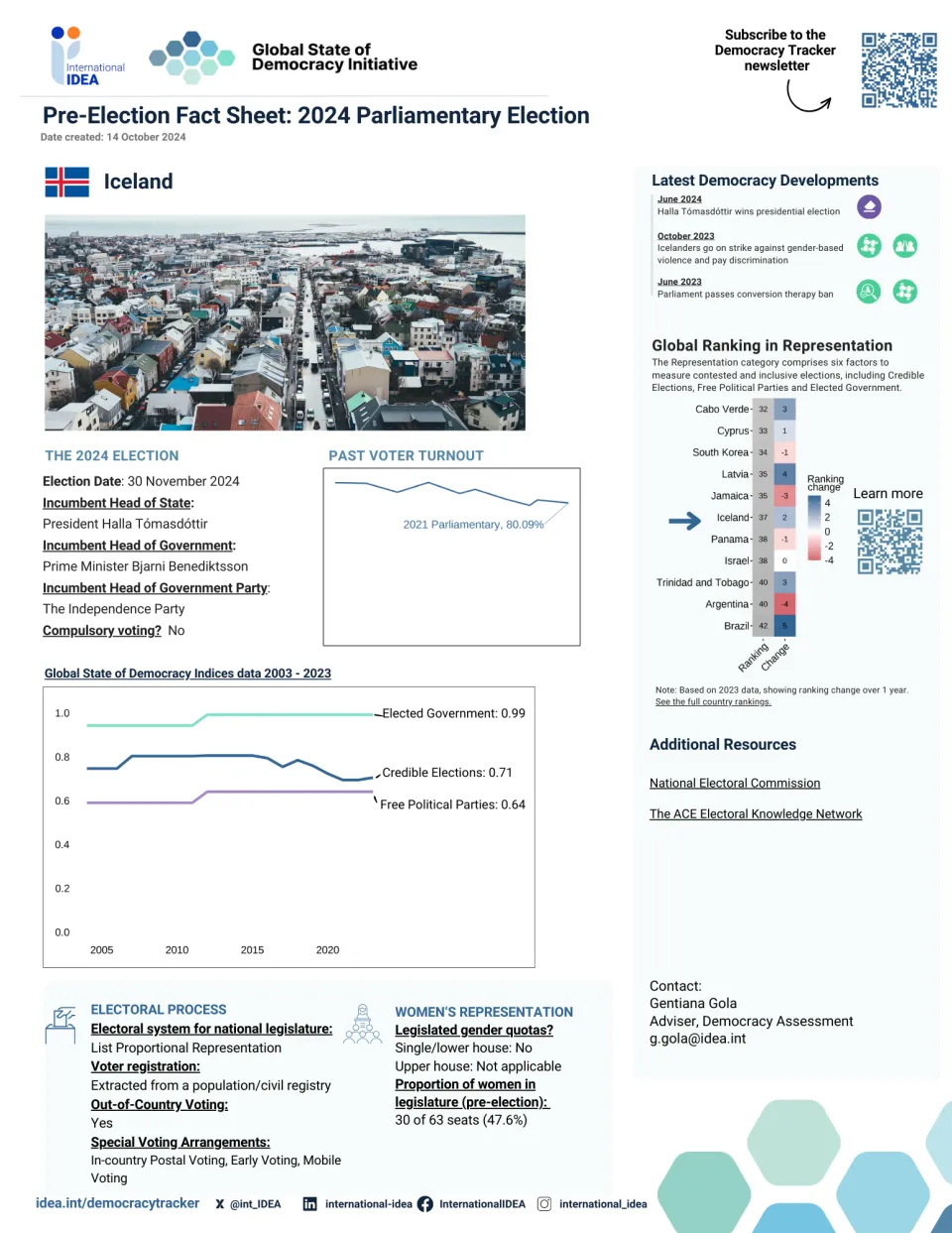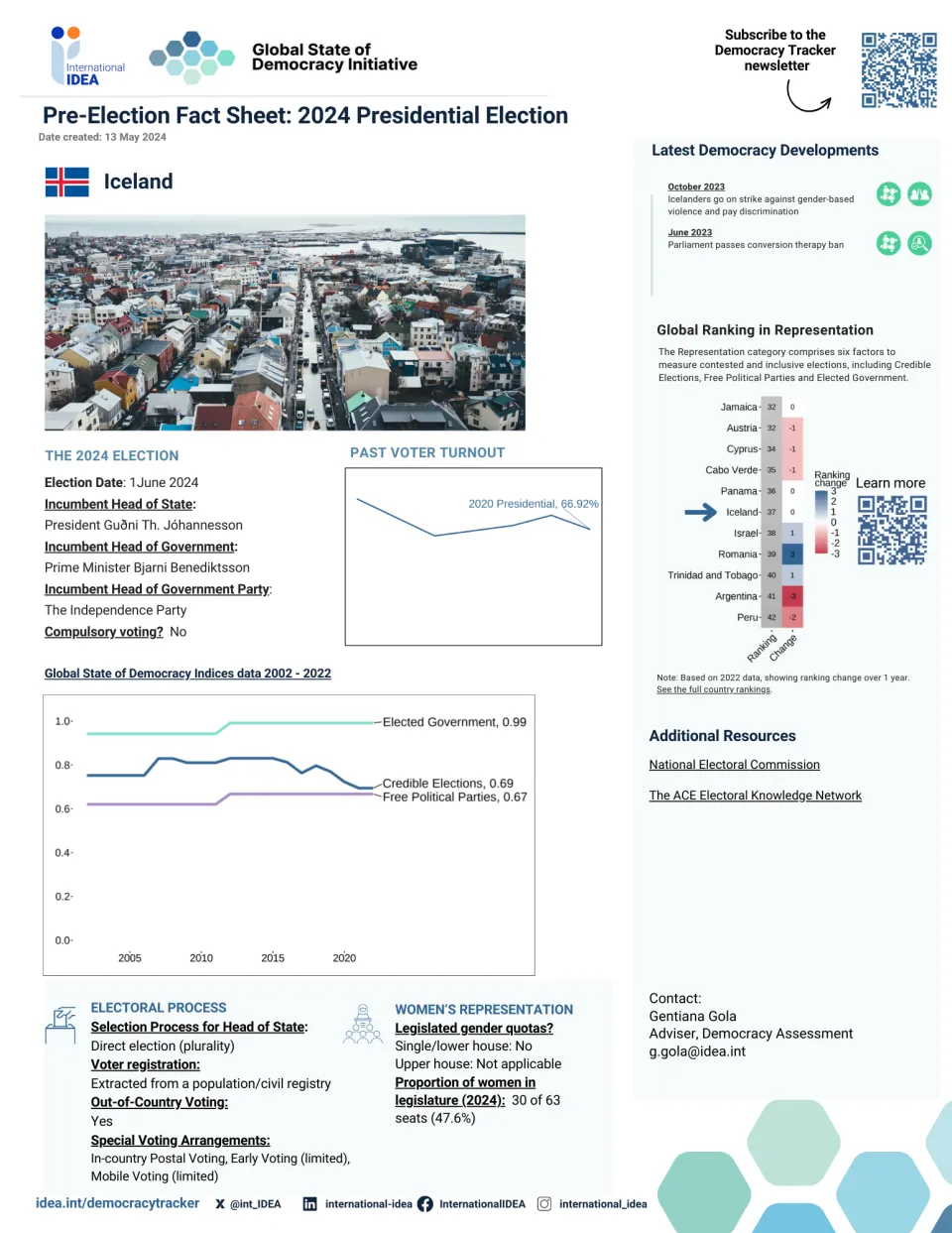
Iceland
Exhibiting high-range performance across all four categories of the Global State of Democracy (GSoD) Framework, Iceland is amongst the world’s top 25 per cent of countries with regards to all factors of democratic performance, except Inclusive Suffrage. Iceland has experienced significant declines between 2019-2024 in Economic Equality (now performing at mid-range) and the Freedom of Expression sub-factor; the latter concerning academic freedom. Economically speaking, Iceland has a high-income and service-based economy. It is vulnerable to volatility, however, due to the prominence of commercial fishing and tourism, and as Iceland grapples with inflation and the financial strain of its active volcanoes. Iceland has opted for sustainable energy generation, with 85 per cent of energy consumption coming from renewable sources, and has adopted a shorter working week.
Founded by settlers during the Viking Age, Iceland fell under Norwegian rule in 1264 and subsequent centuries of Danish rule between 1380-1944, including a period of Allied occupation during the Second World War. Declaring full independence in 1944, Iceland is a relatively young state. Whilst self-determination largely constituted politics in the century prior to independence, contemporary politics has been fundamentally marked by the financial crisis of 2008. Although its economy has recovered since the collapse of the banking system–the largest experienced by any country relative to the size of its economy—Iceland’s level of political trust has not, and Absence of Corruption remains at its lowest levels. Political competition in Iceland has also undergone a fundamental restructuring, with new political parties rising in prominence and coalition constellations taking shape. Rural-urban and left-right lines remain important political cleavages, however.
Whilst the 2021 legislative elections saw the first government since 2008 retain its majority, a snap general election had to be called in 2024 due to coalition disagreements over immigration, energy policy, and the cost-of-living crisis. Traditionally homogenous, Iceland has experienced increased levels of immigration over the past decade. Approximately 18.2 per cent of the population are migrants, a significant proportion of whom are Polish nationals. The UN refugee agency deems Iceland to have “a favorable protection environment” for forcibly displaced and stateless persons, despite criticisms over the detention and integration of asylum seekers.
According to the GSoD Indices, Iceland performs highly in Gender Equality, and the country is known for its commitment to LGBTQIA+ rights. Iceland has high levels of women’s participation in both the labor force and politics; in 2024, the country elected its second woman president and legislative elections resulted in an all-women-led government. Businesses with more than 25 employees are required to demonstrate gender pay equality. However, a stark increase in gender-based violence and the gender-segmentation of the labor force are still causes for concern. Iceland has legalized same-sex marriage and, in 2023, passed a ban on conversion therapy.
As declines in Economic Inequality persist, fundamental needs such as housing are high on the political agenda, and immigrants make up a growing share of the population, it will be important to watch aspects of Rights (Political Equality and Basic Welfare) in the years to come. Lower than average public trust in government decision-making and parliamentary accountability mechanisms—amid ongoing corruption scandals and record-low Absence of Corruption scores—highlights the importance of paying attention to this factor and the wider Rule of Law in Iceland.
Last updated: May 2025
https://www.idea.int/democracytracker/
November 2024
Opposition Social Democratic Alliance wins early general elections

Iceland held early parliamentary elections on 30 November, the sixth since 2008. Prime Minister Bjarni Benediktsson, who came to power in April after his predecessor resigned, called for elections in October after ending the coalition between his Independence Party, the Progressive Party, and the Left-Green Movement due to disagreements over immigration, energy policy, and the cost-of-living crisis. Out of the 63 Alþingi (Parliament) seats, the Social Democratic Alliance (Samfylkingin) won 15 seats with a vote share of 20.8 per cent, becoming the largest party. The incumbent Independence Party (Sjálfstæðisflokkurinn) secured 14 seats with a vote share of 19.4 per cent. The centre-right Liberal Reform Party (Viðreisn) secured 11 seats, with a vote share of 15.8 per cent. Voter turnout was 80.1 per cent, remaining nearly unchanged from 2021.
Sources: Icelandic National Broadcasting Service, Euronews, Al Jazeera, International IDEA
June 2024
Halla Tómasdóttir wins presidential election

In the presidential elections that took place on 1 June, the top three candidates were women. Halla Tómasdóttir, an independent candidate, won with 34 per cent of the votes in the first-past-the-post voting system, where the candidate with the most votes wins regardless of the total number of votes cast. A businesswoman and investor, Tómasdóttir said she will focus on issues like youth mental health, tourism development, and artificial intelligence. Former Prime Minister Katrín Jakobsdóttir from the Left-Green Movement came second with 25.5 per cent, while independent Halla Hrund Logadóttir, who pledged to prioritize energy and environmental issues, gender equality, and to expand opportunities for all, finished third with 15.5 per cent. 46 per cent of the candidates were women. Tómasdóttir becomes Iceland’s second female president, following Vigdis Finnbogadottir, who became the world's first democratically elected female president in 1980. Although the president is largely ceremonial, she can veto legislation or call referendums. Voter turnout was 80.8 per cent, the highest among presidential elections since 1996.
Sources: Euronews, Iceland Monitor, Iceland Review (1), Iceland Review (2), Al Jazeera, International IDEA
October 2023
Icelanders go on strike against gender-based violence and pay discrimination
On 24 October, more than a quarter of Iceland’s population went on a full-day strike against gender-based violence and pay discrimination. The crowd of over 100,000 women and non-binary people was joined by Prime Minister Katrín Jakobsdóttir and caused widespread disruptions, with schools, kindergartens and most banks having to close. It is the first strike of its kind since 1975, when a full-day strike by 90 per cent of Icelandic women resulted in the creation of a women’s political party and the election of the world’s first elected female president. Although the country at present is among the world’s most gender equal, research from the University of Iceland has found that 40 per cent of Icelandic women have experienced physical and/or sexual abuse in their lifetime. National statistics from 2022 reveal that Icelandic women earn 9.1 per cent less than Icelandic men, with a gap of over 25 per cent in some occupations.
Sources: Kvennafri, The Global State of Democracy Indices, The Guardian, The Saga Cohort, Statistics Iceland
June 2023
Parliament passes conversion therapy ban
In a unanimous vote, Iceland’s parliament has approved legislation that bans conversion therapy related to sexual orientation, gender expression and gender identity. The new legislation, proposed by the Reform Party MP Hanna Katrín Friðriksson, garnered broad cross-party support. There were no votes against the law, with 53 MPs voting in favour, three abstaining, and seven being absent. According to the legislation, which will take effect on 1 January 2024, individuals who carry out or subject adults or children to conversion therapies could face sentences ranging from two to five years in prison. The LGBTQIA+ community and rights groups in Iceland have welcomed the legislation.
Sources: High North News, Parliament of Iceland - Alþingi, Jurist, Pink News
See all event reports for this country
Global ranking per category of democratic performance in 2024
Basic Information
Human Rights Treaties
Performance by category over the last 6 months
Election factsheets
Global State of Democracy Indices
Hover over the trend lines to see the exact data points across the years
Factors of Democratic Performance Over Time
Use the slider below to see how democratic performance has changed over time

